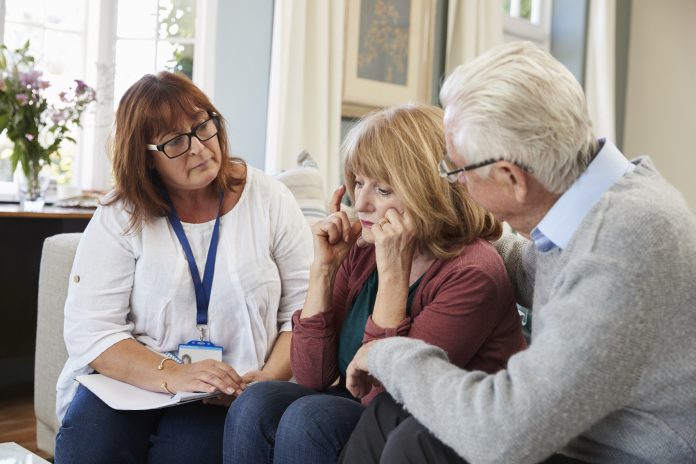Peter Seldon, CEO, Consultus Care & Nursing, explores the impact of COVID-19 and mental health within social care settings and what best practices can be adopted to support both carers and clients
COVID-19 has impacted every single one of us in one way or another. The negative effects of lockdown have been destructive and wide reaching. From forcing businesses to shut, to leaving many individuals unemployed, the pandemic has spread fear and anxiety across society, as well as grief and devastation as loved ones sadly succumb to the illness. The impact of social isolation must also be acknowledged – the long-term impact of which is likely to be significant.
For all the key workers who have worked tirelessly to keep essential services running, to those working on the frontline in health and social care, who have never before witnessed the devastation and unprecedented levels of pressure caused by the virus. It is no surprise that the impact on one’s mental health is taking its toll.
The effects of social isolation
Older people, even those deemed in good health, are one of the most at-risk groups of falling critically ill or worse still, dying from COVID-19. As a result, it has been entirely necessary for those individuals to shield and limit all social contact. But this does not come without consequence. The negative effects of social isolation and loneliness on the mental health of older people has been well documented. Psychological symptoms often include depression and anxiety which severely impact overall quality of life. Physical health is also proven to be compromised with social disconnection being linked to increased morbidity from chronic disease and higher all-cause mortality. Furthermore, the enforced social isolation as a result of the pandemic is being associated with anxiety and post-traumatic stress, which could remain prevalent long-term.
Many older adults, at some point, will require care in some form. Often, the default option chosen for this is residential care, but loneliness is not always associated with physical isolation and it is common for someone with many human contacts, like those in a care home, to feel lonely. Indeed, research has found that up to 55% of older residents in care homes have regular feelings of loneliness. Moreover, in these current times, for care home residents where family visits have had to be severely restricted or completely eradicated due to the fear of spreading COVID-19, the negative emotional effects are considerable. Carers supporting those living with dementia or other cognitive impairments, have reported rapid deterioration among people who had been deprived of regular contact with family members. So, what is the solution to this challenge?
Combating social isolation with live-in care
Unsurprisingly, 97% of adults asked about this said they wished to remain in their own homes in later life, and do not wish to sell their beloved home to move into residential care. Awareness is growing around the alternative model; live-in care, further accelerated by the pandemic as it becomes widely recognised as the safest and preferred option – and with costs ranging from £800 – £1,400 per week for fully managed care, it is no more costly than good care homes, and can be funded over time through flexible drawdown against lifetime mortgages, formerly known as ‘equity release’.
Live-in care not only offers 24/7 around the clock care, but it also offers companionship which in turn helps to combat social isolation and loneliness. Carers are carefully matched with their clients based not only on their physical needs but also personality which enables meaningful and fulfilling relationships to be built:
“We needed a live-in nurse urgently after my aunt had a fall. Consultus was recommended to us and I am so grateful that they were! From the very first phone call, I found them to be extremely helpful and sympathetic and most importantly incredibly competent. My aunt fell on the Friday and by the Tuesday we had been assigned a live-in nurse. What I liked especially about Consultus is that they do not match the client to the nurse geographically but by character. How refreshing! My aunt was a very strong-willed and determined lady. After an extremely thorough assessment Consultus immediately realised that they needed to assign an experienced and adroit nurse. They could not have found someone more perfect for us. Not only was the nurse super-competent but we were so impressed by her sympathetic nature and caring manner. My aunt honestly could not have been in better hands. The Consultus nurse gave us the ability to give my aunt her strongest wish, which was to die at peace in her own home.” – Niece of Consultus Care & Nursing client.
“My mother became unable to look after herself due to failing memory. Not eating or drinking regularly, or taking her medication on time, if at all, and was generally deteriorating in health and ability to look after herself. Consultus Care were very helpful in guiding us to select the type of care we needed and quickly found a 24/7 carer to live in with mum. To avoid any chance of COVID-19 infection their carers self-isolate between jobs so we were confident that it was safe to bring another person into Mum’s flat. Consultus Care suggested a member of staff as a 24/7 carer to mum for 4 months to give time for my brother to adapt his house for our Mum to live with him. I cannot praise Mum’s carer, highly enough. Right from the start she ensured Mum was “fed & watered” regularly, took her medication on time and ensured she got up and walked around several times every day. She did everything needed to run the household. Mum’s health and mobility is much improved. All thanks to her carer for her care and compassion.” – Son of Consultus Care & Nursing client.
Having a live-in carer can bring purpose to an older person’s life; the day can be planned around the client’s needs and the activities they enjoy doing most – 97% of people receiving care in their own home say they do something they value and enjoy compared to just 5% in residential care. From singing, listening to music, reading, painting, walking and even yoga and meditation, gentle physical activities not only stimulate the mind, but they help to increase mobility and blood flow. We are all familiar with the saying ‘you can feel lonely in a crowded room’; suitably trained, capable, empathetic carers relate to their clients – sometimes just to be heard is all one needs to feel less lonely.
It’s also widely recognised that owning a pet can help to lift depression, as well as reducing loneliness, so it comes as no shock that a study found that 20% of older people would put their health at risk by refusing to go into care without their pet. Parting from much loved animals is one of the most distressing consequences of moving into most residential care homes, but with live-in care, individuals remain in their own home with their beloved companion which is proven to help combat feelings of social isolation. Indeed, 84% of pet owners agreed that having a pet made them mentally healthier in a report published by PDSA.
Caring for carers
Caring for someone elderly or vulnerable is undoubtedly rewarding, and most carers feel a sense of fulfilment and of ‘giving back’ when they choose the profession. But it does not come without daily challenges, and nobody could have foreseen the enormous levels of strain that COVID-19 would put on them. Findings from the COVID-19 pandemic to date have revealed a substantial mental health burden on social care staff.
The heroic carers working in residential care settings have witnessed tremendous tragedy as COVID-19 spread through many care homes, sadly taking the lives of tens of thousands. They have been subject to a lack of PPE and testing for a sustained period (although this did improve over time), along with many other healthcare workers, and have been endangered with many thousands of patients being released unsafely from hospital by the Government at the outset of the pandemic last year. The fear of spreading the virus to patients or taking the virus home has undoubtedly caused widespread anxiety among carers. Added to this is the overarching workload; carers were strained pre-pandemic, and reports show that 80% of carers have had their workload increased since the pandemic.
Live-in carers have also faced huge pressures, with many choosing to isolate for long periods of time with their clients to achieve the safest practice and limit cross-infection. This resulted in an almost non-existent cross infection, but these carers have sacrificed seeing their families, working tirelessly for months on end with no break. This is where in many cases, particularly during lockdown that live-in carers have explained how their client was more than just a client, they became a friend:
“I am working as a carer for Rosemary, but I’m a companion too. Right from the word go, I did not want this to just be a carer situation, because we both needed a friend. We are everything to each other at the moment. I have family and friends who are constantly calling, but the rapport that I have with Rosemary is all I need to be honest.” – Julie Riddell, Live-In Carer for Consultus Care & Nursing.
Most people in ‘regular’ jobs will experience ‘bad days’ at the office but are mostly able to return home that evening to talk to someone about their experience and unwind. Unfortunately, not all carers have that luxury, many carers come from abroad, choosing to dedicate their lives to the profession, meaning that they may not have an established support network to reach out to.
It is therefore the duty of the care provider to provide that much needed support to carers. Providing a communal home for carers to gain some respite or take holidays not only gives carers that much deserved downtime but allows carers to spend social time together. It’s widely recognised that simply talking about problems and sharing negative emotions with someone can reduce physical and emotional distress.
Furthermore, providing an online ‘closed’ community platform is one way to give carers an opportunity to safely communicate and share any questions or comments among like-minded, peer group colleagues, and this works particularly well at times of uncertainty like that of COVID-19. It also enables care providers to better understand carers’ worries and concerns, enabling them to address these issues by providing improved support.
Social isolation can affect everyone in the social care sector including healthcare workers and clients alike, particularly during the current pandemic where lockdown restrictions have been imposed. While mental health is a complex area, there is evidence to suggest that best practices, including talking, gentle activities and exercise, and remaining in one’s own home with a beloved pet, can help alleviate feelings of isolation and loneliness. Live-in care can offer a two-way street between client and carer to help alleviate feelings of isolation and loneliness, in turn, improving their physical health and overall quality of life.
Please note: This is a commercial profile
© 2019. This work is licensed under CC-BY-NC-ND.












